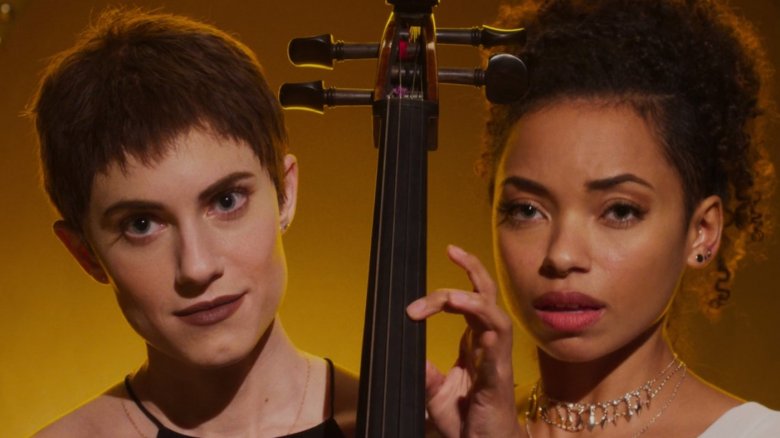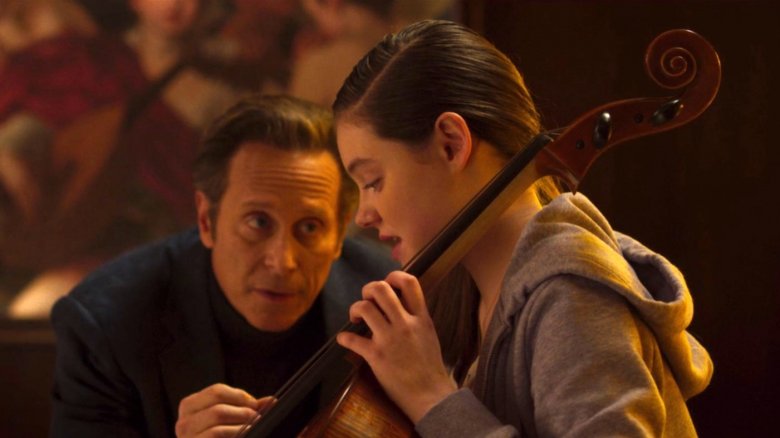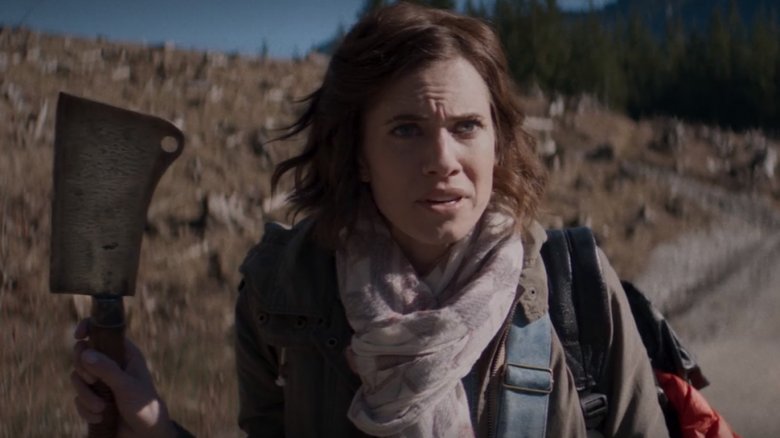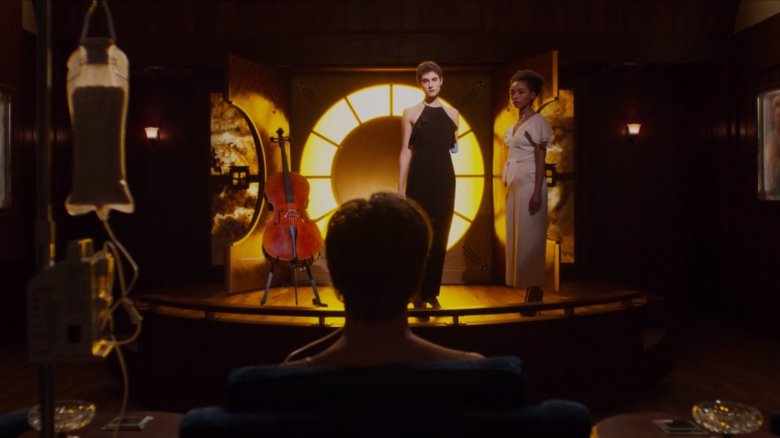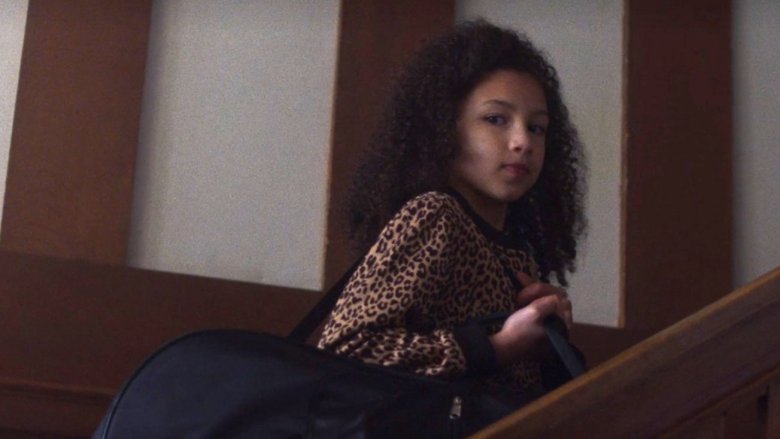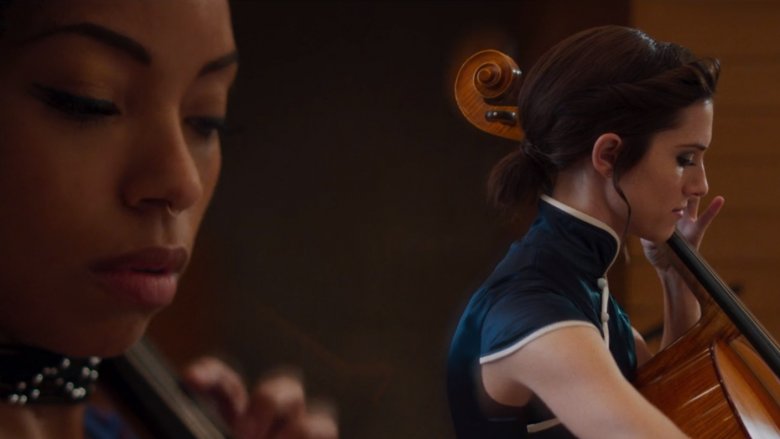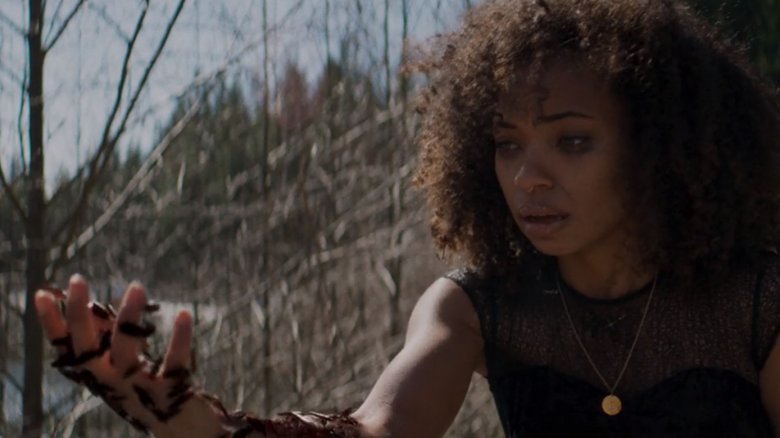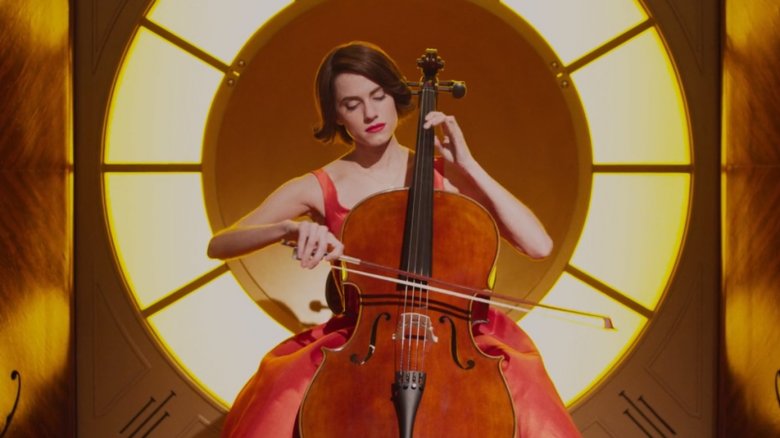The Ending Of The Perfection Explained
You never know where good horror is going to come from. You might have the most iconic, franchise-bearing monster of the last 50 years and still wind up with, say, a Predator movie nobody sees. Meanwhile, a fresh idea without any obvious nightmare fuel can blow everybody away. At its surface, for example, the world of classical musicianship might not seem like a wellspring of terror, but neither did upper middle-class dinner parties, and we all still loved Get Out.
Following on the heels of Netflix's psychological horror juggernaut Bird Box, The Perfection is poised to be the streaming service's next block-free blockbuster. Director Richard Shepard brings audiences into a world of obsession, deception, and inescapable itchiness. The movie stars Girls' Allison Williams and Dear White People's Logan Browning as two world-class cellists who both attended the same elite musical academy and, well, that's about as much of the story as we can talk about without delving deep into spoiler country.
With that said, onward unto spoiler country! Here's the ending of The Perfection explained.
A minor breakdown
The story begins, arguably, in 1927, when Anton's grandfather founded the Bachoff Academy of Music. It's heavily implied (albeit by Anton, so take it with a pinch of gaslit salt) that there's a tradition of "perfecting" promising young artists through despicable means: performances by veteran students that fall short of perfection are punished via ritualized sexual assault by the school's staff. Decades of this behavior take place before one of the school's proteges, Charlotte Willmore, escapes the cycle of abuse when her mother falls ill and needs her help. As she leaves the school, Lizzie, a new pupil, enters.
A decade later, Charlotte has undergone extensive therapy, including ECT treatments. She's still trying to deal with the damage done to her at Bachoff, which left her suicidal. When her mother passes away, she's free to act on her anger. Having seen pictures of Lizzie, she notices the telltale signs of the Academy's abuse, and decides to put a stop to it. She tracks down the head instructor, Anton, who's in Shanghai with Lizzie and the other teachers scouting new talent.
Once there, Charlotte falls back into the good graces of the school's staff, meets Lizzie, and seduction ensues. The two decide to take a trip into the Chinese countryside together, and stuff starts to get prescription strength weird.
A major breakdown
On the trip, Charlotte drugs Lizzie with medication she took from her mother, inducing a stomach flu and hallucinations. The two are kicked off their bus in the middle of nowhere, and Charlotte convinces a delusional Lizzie that her hand is full of bugs, prompting Lizzie to go all 127 Hours on herself with a cleaver. Lizzie passes out, and when she wakes up, Charlotte tells her that this was the only way to free her from the Academy's brainwashing, and that they'll turn their backs on her now that she's no longer useful to them. Charlotte returns home, and Lizzie, unable to get any help from the local authorities, goes back to Bachoff.
Charlotte is proven right. The Bachoff staff reject Lizzie, and she breaks into Charlotte's house, beating her to the ground before acknowledging that Charlotte was right. Together, the two formulate a plan. Lizzie brings Charlotte back to the Bachoff Academy, ostensibly as a prisoner. She's chained up and forced to play for the staff, and misses one note. As the faculty close in on her, they start falling to the floor. Lizzie has drugged their drinks.
With the other teachers incapacitated, Lizzie and Charlotte go after Anton. In the ensuing beatdown, Charlotte's arm is mutilated. In the final shots of the movie, we see Charlotte and Lizzie, each with one arm, playing a single cello together. Anton, meanwhile, is seen dismembered, blinded, and castrated, hooked up to a feeding tube, being forced to listen.
Okay, so the ending
It probably goes without saying that this movie is rooted deeply in recent social phenomena like the Time's Up and #MeToo movements, and it brings a level of fictionalized catharsis in the form of a gruesome conclusion. This is a long-running tradition in the horror genre: a character or force somewhere on the monster spectrum, representing a real-world fear, is brought low by the forces of good and right. Alien famously used its xenomorphs as an allegory for sexual violence, and Get Out pretty brilliantly turned racism and gentrification into a Frankensteinian monstrosity. In the same way, The Perfection tackles institutionalized abuse, gaslighting, and toxic misuse of power. When Charlotte and Lizzie force a severely de-limbed Anton to listen to them play, it's not just a reclamation of power, it's a metaphorical assertion of self-worth over a malignant power structure that spent years objectifying them.
Unless it was, you know, a fantasy. The entire closing scene has a surreal quality to it, and leaves a lot of questions unanswered. How would Lizzie and Charlotte have tended to Anton's wounds in time to save him, especially when they were bleeding profusely themselves? More damningly, why doesn't Anton have any scars from the knife fight, especially since his face was so mangled?
From the unreliable nature of the protagonists' perspectives to the slow, deliberate distribution of story details, The Perfection is a movie built on uncertainty. It's fitting that the ending would be equally head-scratch-inducing.
Scrambled story
Maybe the most compelling aspect of The Perfection is its use of nonlinear narrative — a story told in fragments presented out of order. From the first frame, the audience is dropped into a story that's been taking place for decades, unaware of how much or how little of what's happening will be explained later on. The trend continues when we see Charlotte and Lizzie's trip through China — first through Lizzie's eyes, drugged and without context, and then more from Charlotte's perspective.
Telling the story this way was a risky move for Shepard and company. Forcing an audience to revisit parts of the story that they've already seen can be a drag, as proven by the way that nobody really remembers 2008's Vantage Point. That said, non-traditional story structure has paid off in the past for movies like Reservoir Dogs and Eternal Sunshine of the Spotless Mind — films for which planting uncertainty in the audience leads to a satisfying payoff and makes trying to guess what's going on part of the fun. The Perfection adds to this by attaching that uncertainty to what should be a pretty simple question in a horror picture: who's the monster here?
Influences
So what were the factors, real and fictional, that informed the way that The Perfection was made? Not necessarily the ones that spring to mind.
For example, the movie almost immediately became a sort of mascot for the #MeToo movement, but according to an interview, the film was already being put together three weeks before the Harvey Weinstein case started that ball rolling. Allison Williams says the writers and director took a lot of inspiration from the documentary series The Keepers, which chronicles the murder of a nun and an alleged cover-up by the Catholic church, set against the backdrop of the Catholic sex abuse crisis.
For visual cues, director Richard Shepard hits a lot of the same notes as Brian De Palma, the man behind films like Scarface and The Untouchables. Shepard especially pointed to De Palma as the inspiration for all of The Perfection's split diopter shots. Thematically, he credited Korean cinema, especially Park Chan-wook's revenge movies Oldboy and The Handmaiden, as his muse.
Misdirection
If you saw the trailer for The Perfection, you were probably pretty intrigued. You were also probably wildly thrown off when you watched the actual movie.
The trailer for The Perfection made it out to be something it was decidedly not: a bug infestation freakout picture. It made heavy use of the scene when, stranded on the side of the road, Lizzie screams at Charlotte about the bugs crawling inside of her arm. Beyond that, we're not given much information as to what the film is about, besides being informed that Charlotte is the kind of person who's always prepared in case a meat cleaver might come in (wait for it) handy.
Netflix was pretty cautious about not giving anything away in the trailer, and it makes sense. The movie's emotional gravity is predicated on the audience having as little information as possible. All that remains to be seen is how much outrage a vocal fraction of the public will express when they don't get the "bugs are eating my insides" movie they so desperately wanted.
That music, though
With everything happening onscreen, the audience could pretty easily overlook some of the musical cues in The Perfection. The thing is, they so shouldn't. It's amazing.
For one thing, Steven Weber's Anton is pretty consistently associated with Mozart's Requiem in D minor. It's a bombastic, foreboding series of pieces, the most dramatic of which, "Dies Irae," plays when Anton approaches Lizzie in the driveway, unaware that he's about to be horribly dismembered as a result of his own misdeeds. Depending on how deeply you want to read into things, it's interesting to note that Mozart was said to have had the foreboding feeling that he was writing the mass for himself before he died unexpectedly, leaving the completion of the composition to one of his students. Then there's the sudden tonal dissonance when classical music is unceremoniously replaced by "It's On" by Deuce Mobb. It's not just a shocking shift, it signals to the audience that Anton is no longer in control of the world he's built.
And finally, there's the fact that Williams and Browning claim that they really did team up to play that last cello piece, one hand each. Significance of the imagery aside, that part's just really cool.
